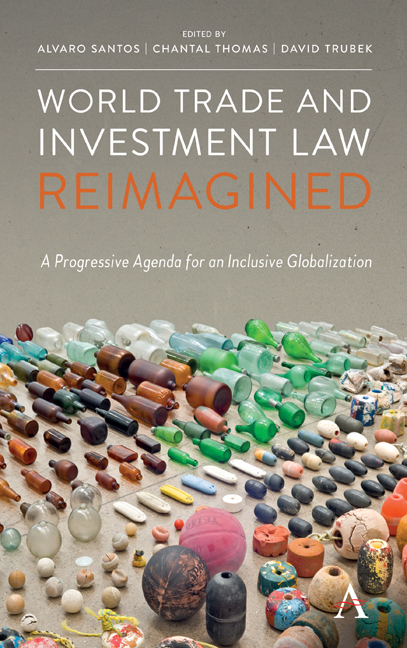Book contents
- Frontmatter
- Contents
- Acknowledgments
- List of Contributors
- Introduction World Trade and Investment Law in a Time of Crisis: Distribution, Development and Social Protection
- PART I RETHINKING THE POLITICAL ECONOMY OF TRADE: COMMENTS ON DANI RODRIK'S STRAIGHT TALK ON TRADE
- PART II SETTING THE STAGE FOR A PROGRESSIVE VISION: EMERGING ISSUES IN WORLD TRADE AND INVESTMENT LAW
- SECTION 1 MAPPING THE NEW CONTEXT FOR TRADE AND INVESTMENT LAW
- Chapter Six The End of Trade and Investment Law as We Know It: From Singularity to Pluralism
- Chapter Seven Heterodox Market Orders in the Global Trade System
- Chapter Eight Embedded Neoliberalism and Its Discontents: The Uncertain Future of Trade and Investment Law
- Chapter Nine Rethinking the RCEP in the Third Regionalism: Paradigm Shifts in World Trade Law?
- Chapter Ten Beyond Normal Trade Law?
- SECTION 2 DEALING WITH MAJOR CHANGES IN THE WORLD ECONOMY
- SECTION 3 FRAMING A MORE EQUITABLE INVESTMENT LAW REGIME
- SECTION 4 SUPPORTING DEVELOPMENT
- SECTION 5 REINFORCING SOCIAL PROTECTION: SPREADING THE BENEFITS OF TRADE, DEALING WITH LOSSES AND EXPLORING THE TRADE–IMMIGRATION NEXUS
- Index
Chapter Six - The End of Trade and Investment Law as We Know It: From Singularity to Pluralism
from SECTION 1 - MAPPING THE NEW CONTEXT FOR TRADE AND INVESTMENT LAW
Published online by Cambridge University Press: 07 September 2019
- Frontmatter
- Contents
- Acknowledgments
- List of Contributors
- Introduction World Trade and Investment Law in a Time of Crisis: Distribution, Development and Social Protection
- PART I RETHINKING THE POLITICAL ECONOMY OF TRADE: COMMENTS ON DANI RODRIK'S STRAIGHT TALK ON TRADE
- PART II SETTING THE STAGE FOR A PROGRESSIVE VISION: EMERGING ISSUES IN WORLD TRADE AND INVESTMENT LAW
- SECTION 1 MAPPING THE NEW CONTEXT FOR TRADE AND INVESTMENT LAW
- Chapter Six The End of Trade and Investment Law as We Know It: From Singularity to Pluralism
- Chapter Seven Heterodox Market Orders in the Global Trade System
- Chapter Eight Embedded Neoliberalism and Its Discontents: The Uncertain Future of Trade and Investment Law
- Chapter Nine Rethinking the RCEP in the Third Regionalism: Paradigm Shifts in World Trade Law?
- Chapter Ten Beyond Normal Trade Law?
- SECTION 2 DEALING WITH MAJOR CHANGES IN THE WORLD ECONOMY
- SECTION 3 FRAMING A MORE EQUITABLE INVESTMENT LAW REGIME
- SECTION 4 SUPPORTING DEVELOPMENT
- SECTION 5 REINFORCING SOCIAL PROTECTION: SPREADING THE BENEFITS OF TRADE, DEALING WITH LOSSES AND EXPLORING THE TRADE–IMMIGRATION NEXUS
- Index
Summary
The global trade and investment law regime is disintegrating. It is becoming increasingly impossible to speak of a singular regime spanning the globe; instead, there are now several regional-based regimes with quite distinct characteristics.
A rethinking of trade and investment law (TIL) needs to take this insight as its point of departure and is possible only by understanding the structural composition and direction world society is taking and the deep-seated cultural and social (including political) structures and contexts within which it operates. Both orthodox and heterodox TIL relies on assumptions concerning the state of the world and the driving forces behind it, but those assumptions need to be subjected to scrutiny and substantial rethinking.
For heterodox TIL, critical globalization studies (CGS) has emerged as a central counternarrative to the neoliberal globalization discourse of the preceding decades. CGS rightly points out the deficiencies of the neoliberal paradigm and the problems created through increased inequality, the straightjacketing of policy choices and the volatility created in the world economy due to the boom-and-bust culture installed through liberalization of capital markets and the like. But by digging a bit beneath the surface of policy discourses and practical politics, a number of structural transformations can be observed that might also need to be considered when rethinking TIL.
The core paradox we are dealing with is that increased globalization has implied an increase rather than a decrease in global diversity. A future-oriented TIL therefore should be thought of in the plural, not in the singular, as it is likely to fragment into a number of regional TIL regimes based on very different philosophies and institutional setups.
The End of the Western-Centric World
Claiming that the world is at a tipping point easily becomes tiresome— all ages and eras believe they live through a “special moment.” However, we may indeed be experiencing a tipping point. The breakdown of the Eurocentric world is now being followed by the breakdown of the Western-centric world. The Eurocentric world started to collapse in the late nineteenth century with the rise of the United States, and later Japan and the Soviet Union, and became manifested in the mid-twentieth-century decolonization processes. Today the concept of the West is disintegrating, with Europe and the United States moving steadily apart in political, economic, social and cultural terms and becoming strangers.
- Type
- Chapter
- Information
- World Trade and Investment Law ReimaginedA Progressive Agenda for an Inclusive Globalization, pp. 67 - 72Publisher: Anthem PressPrint publication year: 2019



